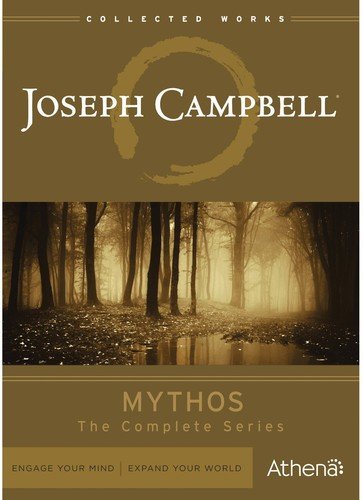
Written by Brandie Ashe
If you’ve ever taken a literature course, it stands to reason that the name “Joseph Campbell” may have popped up in discussions of the books and poems you likely studied. A longtime professor at Sarah Lawrence College and world-renowned expert on comparative mythology and religion, Campbell’s remarkable body of work traces the evolution of myths throughout the course of civilization and elucidates the patterns and symbology associated with them—basic elements, or archetypes, that transcend the limits of culture, recurring in all forms of human expression from literature to art to various modes of storytelling, since the dawn of man. His theories and scholarship have been greatly influential not only in academic circles, but in popular culture as well: director George Lucas, for example, has long credited Campbell’s work as being a strong source of inspiration during the development of the Star Wars film series.
After Campbell died in 1987, his widow, Jean Erdman, co-founded the Joseph Campbell Foundation, which remains dedicated to preserving and promoting Campbell’s work. Those continued efforts have resulted in the publication and collection of Campbell’s complete works, from print to lectures to audio and video compilations. The most recent (and welcome) release from the JCF is the complete DVD series Mythos, a collection of more than fourteen hours of Campbell’s lectures on the world’s grand mythological history—what Campbell himself labeled “the one great story of mankind.” Those lectures were filmed and eventually released on PBS—in two heavily-edited forms—soon after Campbell’s death, under the titles Transformations of Myth through Time and The World of Joseph Campbell. In 1999, five of the original, unedited lectures were finally released for the first time; another five were released the following year. In 2011, a third volume of five additional lectures was released, and all three have now been compiled, for the first time, into a single, six-disc box set.
The first volume, subtitled “The Shaping of Our Mythic Tradition,” is an overall introduction to the concepts that define the basis of Campbell’s work, from discussions of psycho-social development of “self” to the evolution of religion and mythology from the earliest cultures of man. Volume Two, “The Shaping of the Eastern Tradition,” emphasizes the rise of Asian religions such as Hinduism and Buddhism, particularly highlighting the latter and the notion of enlightenment. The third volume, “The Shaping of the Western Tradition,” is likely of most interest for many viewers—it traces the development of mythology and archetypes through the literature and art of the Western world, especially focusing on the growth of the notion of “romantic love,” a relatively new invention of the 12th century. In connection with that development, Volume Three pays particular attention to the King Arthur legends, the 19th-century German Romantic philosophers, and modernity in the guise of Thomas Mann (of whom Campbell was a huge fan). Taken all together, these lectures are nothing less than an impressively thorough demonstration of the evolution of myth and legend throughout most of the history of human thought.
To watch Joseph Campbell delivering the Mythos lectures is to watch a master teacher at work. He speaks clearly and concisely, explaining sometimes difficult concepts in a way that is both accessible and entertaining. There’s nothing fancy about the set-up here—he stands on stage in front of a lecture hall, sometimes perched on the edge of a desk, addressing an array of students. The camera stays focused on Campbell for the most part, with a few cuts to photographs and displays of the concepts discussed. The entire experience of watching these DVDs is much like stepping into a virtual classroom with Campbell. And while that might not sound appealing to some, these lectures are far from dry, instead presenting the material in an engaging, fascinating, and occasionally humorous manner.
One minor complaint: the series is hosted by actress Susan Sarandon, who opens each disc with a brief explanation of what is to come. Sarandon is a genial enough host, but her appearance here—indeed, the presence of a host, period—presents a bit of a problem. In between sections of the lecture, Sarandon reappears on screen to provide transitions to the next part of the series. In the end, however, these transitions feel unnecessary, and the interruptions of Campbell’s lectures, infrequent as they may be, can be a little jarring. (It’s also quite odd to hear Sarandon frequently refer to Campbell as “Joe,” which feels overly informal in this situation.)
The set features no extras. Volume Three is the only one to include an option for subtitles (and though the first two volumes are, per the box, supposedly closed-captioned, I could not get captions to appear on my screen). A small viewer’s guide booklet is included with the set, featuring a brief biography of Campbell and a previously unpublished early draft of “Belief and Power in Myth,” Campbell’s foreword to The King and the Corpse (Heinrich Zimmer, 1948). The quality of the video is about what you’d expect from a series of lectures recorded on videotape 30 years ago—nothing fancy, no special effects, but watchable nonetheless.
As Sarandon states in her introduction to the first disc, Mythos may not be for everyone. But if you are interested in the idea of discovering the roots of all of the archetypes that guide our culture and our collective mindset, and of exploring those archetypes and their prevalence in the development of human civilization, trust me: you will find yourself greatly intrigued by these lectures. At the very least, you are guaranteed to learn something you never knew before. And if you are a teacher of literature, film, art, philosophy, psychology, sociology, religious studies, or history (hell, if you’re a teacher of any related subject above the ninth-grade level), you owe it to yourself and to your students to watch and share these informative and entertaining lectures with them.